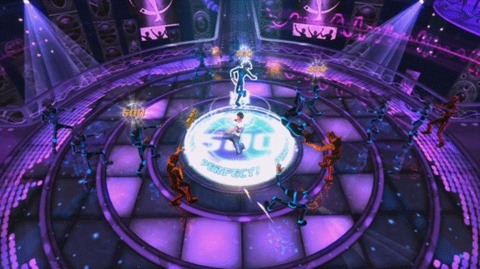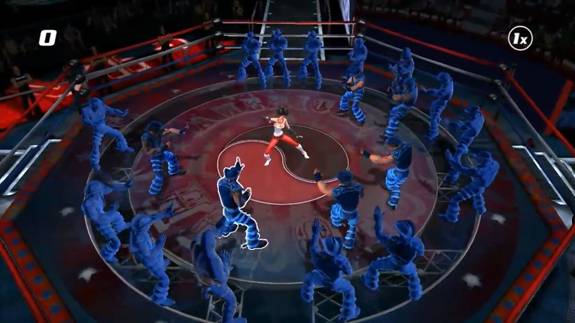Zen Studios, the mind behind the popular Zen Pinball games, has been keeping secrets from us. For one, apparently it's an industrial electronic dance music fan. It also appears Zen Studios has known the formula for an enthralling rhythm game all along, now demonstrable through KickBeat, its roundhouse kick to the PlayStation library. As a much-needed adrenaline-laced injection to the realm of music gaming, KickBeat harks back to what made the genre flourish in the first place, but gives things a twist. Marilyn Manson and kung fu moves together may sound as appealing as peanut butter and tuna, but give Zen Studios' admirable attempt at branching out a fair shake, and it will surprise you.

You hop into action as Lee, a teenage everyman on a mission to retrieve the Sphere, a radiant ball of energy that embodies the spirit of every song that has been or ever will be created. As he chases after the Sphere, he combines some Matrix-style face-kicking and other dazzling martial arts moves with fancy footwork, all in the name of saving music. It's a hokey, throwaway narrative, but it's so cheesy it manages to fit in well with the vibe KickBeat radiates.
Lee's only job as savior of the music is to deliver swift beatdowns to hundreds of baddies who gather around him in a circular formation and attack in rhythm. That's where you come in. Across several arenas populated by masked wrestlers and colorful ruffians, you continue along a path of righteous butt-kicking, smacking down goons to the tune of Papa Roach's "Last Resort" or Marilyn Manson's "The Beautiful People."
Each level is tied to a different track, with a varying aesthetic and rapidly increasing difficulty. Lee stays positioned in the center of a group of ne'er-do-wells as they advance in a set pattern. When an enemy is about to land an attack, you must press the corresponding direction on the D-pad or face buttons. KickBeat throws curve-ball enemies at you that attack on the downbeat, in pairs, or exactly in time with the music. If you're tapping along with the rhythm, you'll string together impressive combos and perform admirably. Missing notes entirely carries the hefty price tag of having a portion of Lee's health whittled away. Once the gauge reaches zero, it's game over.
KickBeat has a disarming allure that veils its challenging nature. Even if you're familiar with the song (and you very well may be) the difficulty ramps up quickly, whether you're ready or not. Enemies that constantly stay in motion, the ambiance of a crowded club, and the pulsating beats work together to ensure your concentration is broken as often as possible. At certain points during a stage, Lee pulls off particularly impressive moves, denoted by quick cinematic animations that zoom out from the action to focus on his physical feats. These can throw you off quicker than a Britney tune in the nu metal song roster, so it's prudent to turn off that option in the menu.

Unfortunately, turning off cinematics and ramping up your own focus doesn't always make things any easier. As you progress, you find yourself struggling to keep up, which can be occasionally maddening. Power-ups that can be absorbed via double-tapping the D-pad or face buttons, such as multipliers or additional health, serve to alleviate the pain of crushing defeat only slightly, and there's such a limited track list that playing the same songs over and over again simply to progress can begin to wear thin on the nerves. Frustratingly enough, once you've moved on to higher difficulty levels, you're no longer helped along by directional icons or indicators to help guide you in the right direction, making some levels feel impossible without an excessive amount of practice.
Fortunately, there's something innately compelling about jumping back in, especially once you feel as though you may finally have mastered the current track. If you're up to it, you can complete the game a second time as a female protagonist, with the difficulty dialed up even further. Hardcore fanatics will undoubtedly flock to the add-your-own-music feature after plastering the leaderboards with their own high scores, but newcomers to the genre should prepare themselves for a butt-kicking. If you've already exhausted Amplitude at insane difficulty or your Oni Dance Dance Revolution tracks have become boring, this might be your next vice.